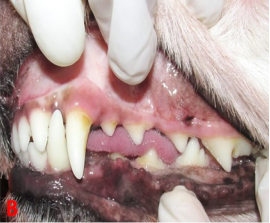Evaluation of the prophylactic action of veterinary dental gel containing Aloe vera and green tea on calculus formation in dogs submitted to periodontal treatment
DOI:
https://doi.org/10.21708/avb.2022.16.1.10325Abstract
The aim of this study was to evaluate the effect of veterinary dental gel containing Aloe vera and green tea, with and without a water additive in preventing calculus formation in dogs after all animals were initially submitted to periodontal treatment. The preventive treatment was performed on 72 dogs, which 24 received treatment with the veterinary dental gel (G1), 24 received treatment with the gel associated with a water additive (G2), and 24 dogs did not receive any treatment (G3). The animals also were subdivided into three groups according to their diet. The gel was applied directly to the dogs' teeth and 500 ml of the additive was added to the water, three times a week. The animals' teeth were photographed every 30 days to observe the time of new deposition of dental calculus. The images were analyzed by MATLAB. The dogs in G1 showed average of new accumulation of dental calculus of 254.8 days, those in G2 also showed an average return of 258.6 days, and G3 showed an average return of 156.7 days. There was a statistical difference between G1 - G3 (p-value = 0,000007885) and G2 - G3 (p-value = 0,00004568). There was no statistical difference between the different food groups. We concluded that the gel used in this study, associated or not with the water additive, was effective in helping to maintain the dental health of the animals for a prolonged period after the surgical procedure to prevent the calculus return.
Downloads

Downloads
Pubblicato
Fascicolo
Sezione
Licenza
Autores que publicam na Acta Veterinaria Brasilica concordam com os seguintes termos: a) Autores mantém os direitos autorais e concedem à revista o direito de primeira publicação, com o trabalho simultaneamente licenciado sob a Licença Creative Commons Attribution que permite o compartilhamento do trabalho com reconhecimento da autoria e publicação inicial nesta revista. b) Autores têm autorização para assumir contratos adicionais separadamente, para distribuição não-exclusiva da versão do trabalho publicada nesta revista (ex.: publicar em repositório institucional ou como capítulo de livro), com reconhecimento de autoria e publicação inicial nesta revista. c) Autores têm permissão e são estimulados a publicar e distribuir seu trabalho online (ex.: em repositórios institucionais ou na sua página pessoal) a qualquer ponto antes ou durante o processo editorial, já que isso pode gerar alterações produtivas, bem como aumentar o impacto e a citação do trabalho publicado (Veja O Efeito do Acesso Livre).


 Esta obra está licenciada com uma Licença
Esta obra está licenciada com uma Licença 